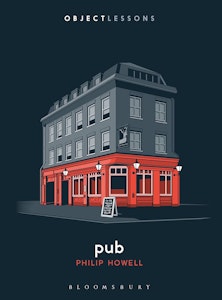This article is taken from the March 2025 issue of The Critic. To get the full magazine why not subscribe? Right now we’re offering five issues for just £10.
This is a book about pubs, by a Cambridge professor. Very naturally, it draws on Cambridge for many of its illustrations. Cambridge is a city that has no shortage of historic pubs. The Eagle has its RAF bar, and its connection to Crick and Watson; The Pickerel has (probably) the greatest antiquity; The Champion of the Thames is a true time capsule. Any number of pubs have a Grade II listing.
The first Cambridge venue to merit a photograph in Philip Howell’s delightfully eclectic little book is The Golden Hind. Surprising. Though well off the hard-beaten city-centre track, “The Hind” is inarguably interesting for its baroque mock-Tudor architecture, and extravagant interior decoration. Fine. But the next pub pictured does not meet anyone’s notability criteria. The picture has compositional oddities: it is taken from a low angle, with a puddle dominating the frame. But what is reflected in that puddle is etched on my mind. Thrillingly, it was, and is, The Ship, found deep in an estate in the north Cambridge suburb of Arbury.
[Howell] lopes discursively through a wholly stimulating range of pub-related subjects
The Ship is not, by anyone’s standards, a prepossessing building. A flat-roofed, brick-built, post-war construction, it has nothing of the history, charm, or University-facing convenience of the central pubs. It appears to have had a pleasant refurbishment at some point in the recent past; the interior certainly looks nothing like I remember it.
Some Cambridge students take it upon themselves to visit all the city’s pubs. As my friend and I found out, it takes time. Conversation along the way must necessarily tour across many subjects, but will return naturally to the nature, purpose, and almost endless variety of the pub itself. It is, at points, almost uncannily like Philip Howell was there with us 20 years ago. (In fact, perhaps he was, having been based in Cambridge since the 1980s.)
His book, an entry in Bloomsbury’s “Object Lessons” series, succeeds comprehensively in its goal to say something interesting about what a pub is, combining history, social comment, and command of the Cambridge context to great effect. I wish I had read it in one sitting, in a quiet corner of a favourite pub. Anyone still carefree enough to do so, should. And although Howell does not talk about pub-ticking completism, I like to think that he would sympathise.

It is a measure of the book’s sensibility, and its imagination, that the first substantive section is titled, simply and emphatically, “Car Park”. Howell recalls, with a winningly misty feel for the romance of a sadly bygone era, being left in the car by his parents while they enjoyed the then child-exclusionary delights of the pub.
From there he lopes discursively through a wholly stimulating range of pub-related subjects: the signs, the business models, the service, the glasses, the staff, the decoration, the punters, the games, the gardens. All is done and dusted within 120 pages of fairly large print, and it’s time for the lights to come up (at least for Howell, who claims never to have achieved the “nirvana” of an invitation to a lock-in; doesn’t he visit The Grapes?).
Whatever any reader knows about pubs, they will still learn more from the book. I now understand the workings of licensing law with much greater clarity, and was fascinated to be apprised of a series of parliamentary attempts to outlaw barmaids in the 1890s (followed, as a natural and necessary reaction, by the foundation of a Barmaids’ Political Defence League in 1908).
And those who know about Cambridge pubs will get even more out of Howell’s rumination. While it’s not easy to picture The Empress as the home of three pigs, each named after districts of Cambridge, roaming around freely among the clientele, apparently so it was until the fairly recent past.
Our own Cambridge quest left the trickiest venues for the end. As Howell rightly remarks, “some pubs just weren’t meant for the likes of you (or me)”. Of nowhere was that more true, at least by reputation, than The Ship. So, in order to put the very last check in the very last box, we went at opening time, somewhere in midweek.
I recall a curious, long entryway, containing broken-down vending machines, and a rising sense of panic. But at the bar we were treated with bemusement rather than hostility. The men already there, and seemingly several beers in, ignored us, as we drank our pints suspiciously quickly. We declined the invitation to have another, and exited into a grey day. It was done. Cambridge was, for better or worse, over.







